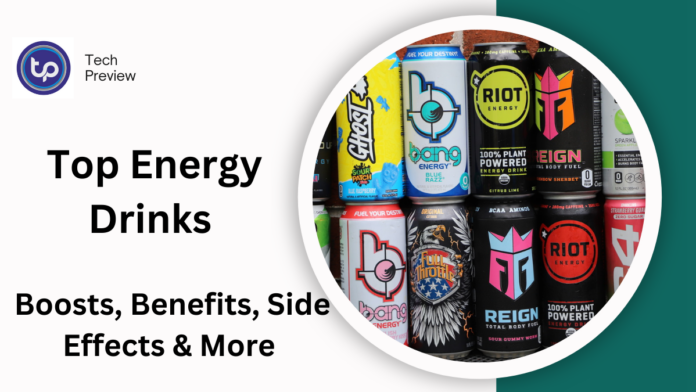Energy drinks have become a staple of modern life. Whether you’re seeking an energy boost for work, studying, or a workout, these beverages promise a quick way to stay awake and alert.
However, choosing the right one can be challenging due to the wide variety of options available. In this guide, we will review the best energy drinks based on their ingredients, caffeine content, flavors, and effectiveness, along with their pros and cons.
Best Energy Drinks: Our Top Picks
1. Celsius Functional Essential Energy Drink
Celsius is a top choice for those who want to avoid the sugar crash and excess calories that often accompany typical energy drinks. With its light carbonation and natural ingredients, it delivers a smooth, refreshing energy boost. A standout feature is its clean ingredients list, making it a healthier option.
- Flavor: Sparkling Orange, refreshing with mild carbonation.
- Caffeine: 200 mg per 12 oz can.
- Calories: 10.
- Sugar: None.
Pros:
- Zero sugar, low calorie.
- Refreshing taste with moderate carbonation.
- Clean energy without a crash.
Cons:
- Some may find the taste too mild or watery.
MUST READ: Factor Prepared Meals Review: Is It Worth the Hype?
2. C4 Energy Drink
A favorite for fitness enthusiasts, C4 Energy Drink is loaded with energy-boosting ingredients and a solid caffeine kick. Its sweet, bold cherry flavor is loved by many, but the potent caffeine content might not suit everyone.
- Flavor: Cherry, tangy and bold.
- Caffeine: 200 mg per 16 oz can.
- Calories: 0.
- Sugar: 0.
Pros:
- Excellent for pre-workout sessions.
- No sugar or calories.
- Bold and intense flavor.
Cons:
- May be too strong for beginners or those sensitive to caffeine.
- Some users report a post-drink jittery feeling.
3. Red Bull
One of the most well-known energy drinks worldwide, Red Bull provides a quick burst of energy, making it perfect for people needing a fast pick-me-up. Its signature citrus taste and reliable effects have made it the go-to drink for millions of people.
- Flavor: Classic citrus, sweet with a tang.
- Caffeine: 114 mg per 12 oz can.
- Calories: 110.
- Sugar: 27 grams.
Pros:
- Widely available and consistent in quality.
- Great for quick energy and mental alertness.
- Light, fizzy texture.
Cons:
- High in sugar, which can cause a crash.
- Not ideal for those avoiding sugar or carbs.
4. Jocko Go
Jocko Go offers a healthier alternative to traditional energy drinks. Aimed at those who want sustained energy without the crash, this drink is caffeine-rich but sugar-free, making it a great choice for anyone seeking a clean, balanced energy boost.
- Flavor: Stevia-based, with hints of Sunny D.
- Caffeine: 95 mg per 12 oz can.
- Calories: 0.
- Sugar: None.
Pros:
- Clean energy with no sugar.
- Perfect for staying alert without the crash.
- Rich in B vitamins for enhanced focus.
Cons:
- Unique taste may not be to everyone’s liking.
- Lower caffeine content might not suit those needing a strong boost.
Comparison: Key Details of Top Energy Drinks
| Brand | Caffeine | Calories | Sugar | Flavor |
| Celsius | 200 mg | 10 | None | Sparkling Orange |
| C4 Energy | 200 mg | 0 | 0 | Cherry |
| Red Bull | 114 mg | 110 | 27g | Classic Citrus |
| Jocko Go | 95 mg | 0 | None | Stevia-based Citrus |
| Reign | 300 mg | 0 | None | Reignbow Sherbet |
| Mountain Dew Kickstart | 92 mg | 80 | 20g | Orange Citrus |
5. Reign Total Body Fuel
Reign is a potent energy drink that’s becoming popular for its heavy caffeine content and unique flavors. It’s designed for athletes who need to stay alert and energized throughout the day. Reign offers long-lasting energy with zero sugar and a clean formula.
- Flavor: Reignbow Sherbet, tangy with a creamy aftertaste.
- Caffeine: 300 mg per 16 oz can.
- Calories: 0.
- Sugar: None.
Pros:
- High caffeine content for sustained energy.
- Zero sugar and low calories.
- Great for those with a high-energy lifestyle.
Cons:
- Might be too much for those new to energy drinks.
- The flavor can be polarizing.
6. Guayakí Yerba Mate
For those looking for a natural, plant-based alternative, Guayakí Yerba Mate offers a more organic energy boost. Unlike most energy drinks, it’s not carbonated, giving it a tea-like feel. The energy comes from the naturally caffeinated Yerba Mate plant, making it a gentler pick-me-up.
- Flavor: Slightly earthy with a sweet finish.
- Caffeine: 150 mg per 15.5 oz can.
- Calories: 120.
- Sugar: 29 grams.
Pros:
- Organic, natural ingredients.
- Gentler caffeine boost.
- Non-carbonated, easy to sip.
Cons:
- Higher sugar content compared to other drinks.
- Earthy flavor may not be for everyone.
7. Fast Twitch
For those who prefer a thicker, sports drink-like texture, Fast Twitch combines hydration with caffeine to keep you energized. The strawberry-watermelon flavor is sweet and refreshing, and the drink provides a gradual energy boost without the sudden crash.
- Flavor: Strawberry-Watermelon.
- Caffeine: 200 mg per 12 oz can.
- Calories: 10.
- Sugar: 0.
Pros:
- Hydration and caffeine in one.
- Gradual energy increase, no jitters.
- Zero sugar.
Cons:
- Thick texture may not appeal to all.
- Flavor is sweet but may taste artificial.
Pros and Cons of Energy Drinks
Pros:
- Provide a quick energy boost and mental alertness.
- Wide variety of flavors and caffeine levels.
- Some options come with added vitamins and electrolytes.
Cons:
- High caffeine can lead to jitteriness, especially in those sensitive to stimulants.
- Many contain sugar, which can lead to a crash later on.
- Some options can be expensive.
Conclusion
Energy drinks are a convenient and effective way to boost your energy levels, but it’s essential to choose the right one based on your needs. Whether you’re looking for a clean, sugar-free option like Celsius, a powerful pre-workout drink like C4, or a natural boost from Yerba Mate, there’s something for everyone. Be mindful of caffeine content and potential sugar crashes, and always drink in moderation for the best results.
People May Ask
1. Are energy drinks safe to consume regularly?
Energy drinks can provide a quick boost of energy, but regular consumption may lead to adverse effects like jitteriness, dehydration, and sleep disturbances. It’s essential to monitor your intake, especially if you’re sensitive to caffeine. Limiting energy drink consumption to one per day is generally recommended for most people.
2. How much caffeine should I consume daily?
The average recommended daily caffeine intake for most adults is around 400 mg, which is roughly equivalent to four cups of coffee. Energy drinks often contain between 100-300 mg of caffeine per can, so it’s essential to keep track of how much you consume from all sources (coffee, tea, sodas, etc.) to avoid exceeding the recommended limit.
3. What are the side effects of energy drinks?
Some common side effects include increased heart rate, anxiety, jitteriness, headaches, and digestive issues. In extreme cases, excessive caffeine consumption can lead to heart palpitations, nausea, or even more severe reactions. People with heart conditions or high blood pressure should consult a doctor before using energy drinks.
4. Do energy drinks help with workout performance?
Many energy drinks, like C4 or Reign, are designed specifically to improve workout performance. They typically contain caffeine and electrolytes, both of which can enhance endurance, focus, and strength during exercise. However, not all energy drinks are created equal, so it’s important to choose one suited to your specific needs.
5. Are there any sugar-free energy drinks?
Yes, many brands offer sugar-free energy drinks, including Celsius, C4, and Jocko Go. These options are ideal for people watching their sugar intake or those who want to avoid the crash that often follows high-sugar drinks.
Click here to learn more.









